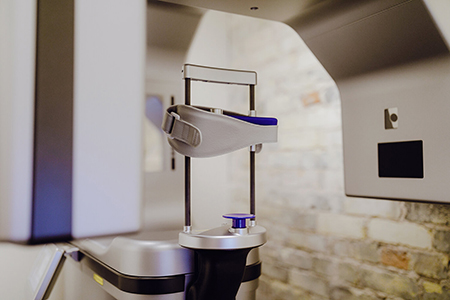
A dysfunctional airway can be caused by the upper and lower jaw being too narrow and set too far back, blocking the airway that sits behind the jaws.


People mainly go to the dentist to get their teeth checked for cavities. And it’s not uncommon to have a cavity or two at your checkups. But, it wasn’t always like this.
Just a few hundred years ago, human beings had naturally straight teeth with no decay. As we’ve developed as a society, we’ve stopped breastfeeding our infants as long and have transitioned over to bottles and soft food at a significantly younger age.
This has actually changed the way our jaws and chewing muscles are formed, creating a recess in the lower third of the face. This causes the lower jaw to become smaller with less room for your teeth and tongue, forcing the teeth to crowd and the tongue to drop back and obstruct the airway—especially while sleeping. This phenomenon is what we now call sleep apnea.

We are a Vivos® integrated provider. Vivos is an appliance system that is used to treat airway deficiencies. In tandem with Vivos and traditional dentistry practices, we assess how your airway could be contributing to your dental problems and your overall health.


Dark circles under the eyes, flat or lack of cheekbones, mouth breathing, dry mouth/lips, swollen tonsils/adenoids, "small chin" or set back lower jaw, crowded teeth or no spacing between baby teeth, tongue/lip tie, forward head posture/"hump" at the base of the neck, and an overactive gag reflex.


Our airway and pattern of breathing start developing from the moment we are born. This radical change of our skull and jaw structure in just the past hundred years can be attributed to how we’ve changed what and how we feed our infants, babies, and toddlers.
We used to breastfeed our babies for three years. As we’ve moved away from breastfeeding and toward bottles, pacifiers, and finger-sucking, it’s changed the swallow pattern and how the face develops. Instead of growing out and forward giving the tongue plenty of space, it becomes more narrow and set back causing obstruction of the airway.
“The act of breastfeeding grows the jaws and teaches the tongue a swallowing pattern that continues to grow and maintain fully developed dental arches. ”

Ready to schedule your next dental appointment or have questions about our services?
Contacting Moxy Dental and Airway is easy! Our friendly staff is available to assist you with scheduling appointments, answering inquiries about treatment options, and addressing any concerns you may have. Whether you prefer to give us a call, send us an email, or fill out our convenient online contact form, we're here to help. Don't wait to take the first step towards achieving the smile of your dreams – reach out to us today and discover the difference personalized dental care can make.